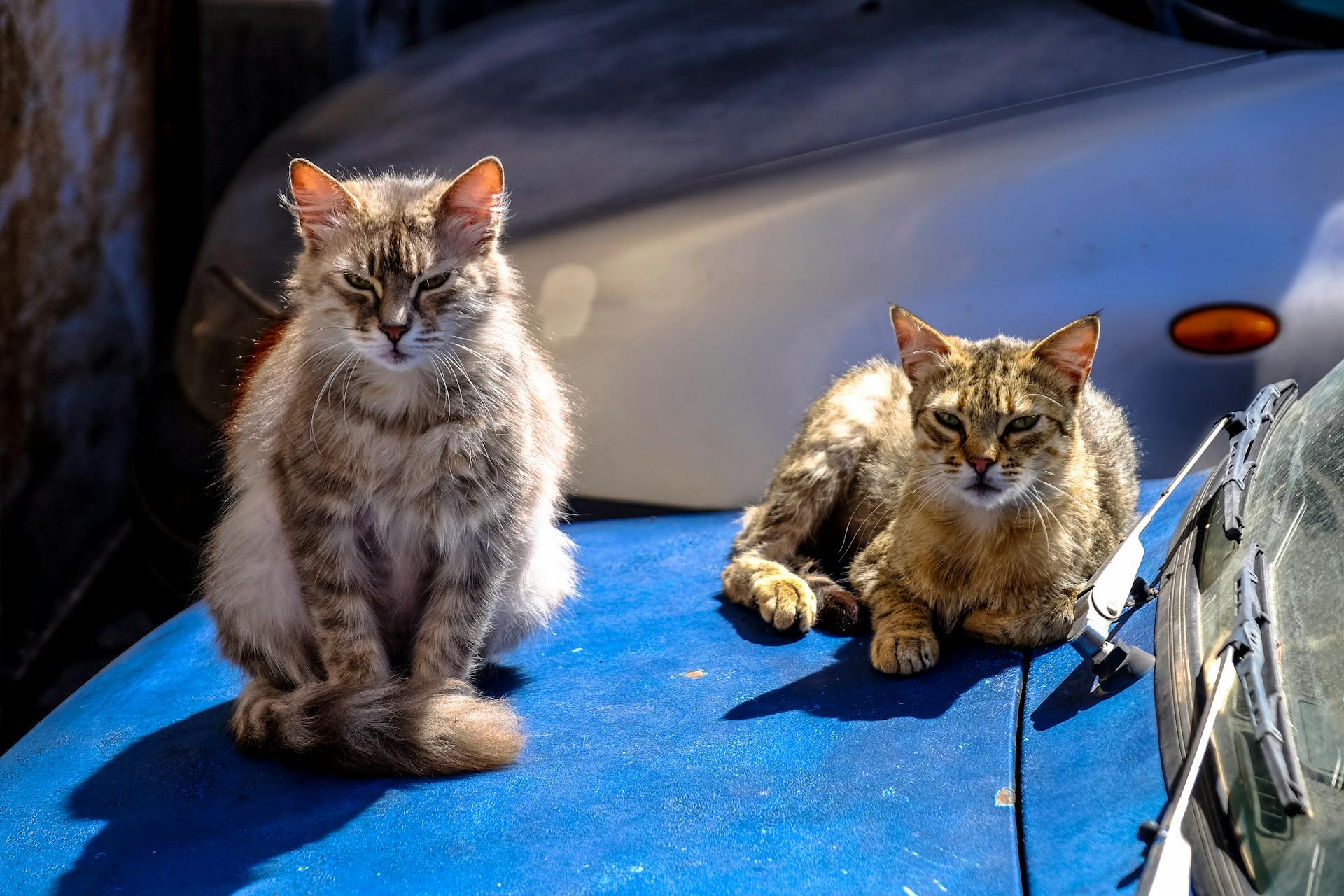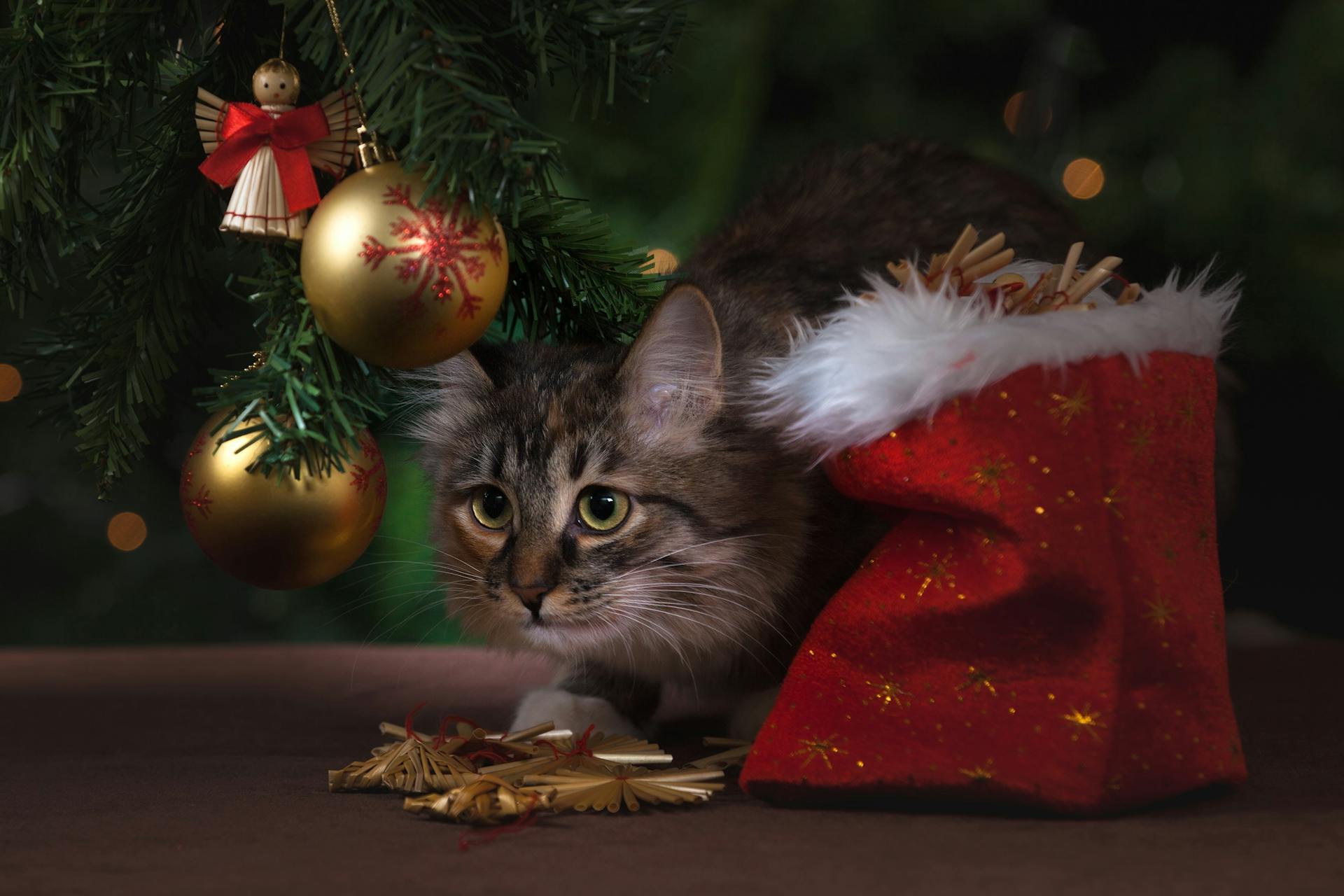
Cats can have dog treats, but it's essential to consider the ingredients and potential risks.
Some dog treats contain onions and garlic, which are toxic to cats.
While a small amount of dog treat might not harm your cat, frequent consumption can lead to serious health issues.
If you're unsure about a particular dog treat, it's best to consult with your veterinarian for personalized advice.
Suggestion: Horse Treats Safe
Can Cats Have Dog Treats?
Cats can have a small number of dog treats, including Beggin' Strips, without experiencing significant toxicity or complications. However, it's not recommended to regularly give your cat dog treats.
Cats are obligate carnivores, which means they require high levels of meat-based protein and certain amino acids like taurine to survive and thrive. Dog treats don't offer the nutrients cats need, so feeding a cat these products only adds to the calorie count without providing a lot of nutritional value.
Cats require a minimal protein percentage of 30-35%, though 40-50% is preferred, and dog treats may not contain enough protein for cats. They also need taurine, arachidonic acid, vitamin A, and niacin, which are essential elements that can't be created by cats and must be ingested through their diet.
A different take: Rice Crispy Treats
Here are some essential nutrients cats need that may not be present in dog treats:
- Protein: 30-35% minimum, 40-50% preferred
- Taurine: essential element for vision, heart function, and immune system health
- Arachidonic acid: essential fatty acid that cats can't create and must ingest
- Vitamin A: essential for coat quality, night vision, and muscle strength
- Niacin: essential for overall health, comes from animal tissue
Feeding dog treats to cats can lead to health problems like vomiting, loose stools, or an upset stomach due to the higher levels of carbohydrates in dog treats. Cats have a limited ability to metabolize carbohydrates, making it essential to provide them with a diet rich in meat-based protein and essential nutrients.
Do Any Risks Exist
Yes, several risks exist when it comes to giving your cat dog treats. Most dog treats are unlikely to cause any harm to your cat, especially if they only eat a small amount. However, since the treats are aimed at dogs, they are not guaranteed to be safe for cats.
Cats have a limited ability to metabolize carbohydrates, as their digestive systems lack specific enzymes needed to break down complex carbohydrates effectively. Dog treats typically contain higher levels of carbohydrates compared to cat treats, which can potentially cause health problems like vomiting, loose stools, or an upset stomach.
Some dog treats may not contain all the nutrients and essential vitamins required by cats, leading to potential health issues. Cats are obligate carnivores, which means they require high levels of meat-based protein and certain amino acids such as taurine, that are not available from plant-based sources.
Dog jerky treats are a better alternative for your cat, but the tough nature of jerky could make it a choking hazard for your cat, so you should always keep an eye on your kitty if you decide to offer them a jerky treat.
If your cat eats a dog treat, check the ingredients list to see if there are any concerning ingredients. It’s also worth keeping the packaging to show your veterinarian just in case. As long as your cat appears well and is showing no symptoms, you should monitor them closely.
Readers also liked: Can Some Cats Not See Lasers?
Suitable Options
If you're looking for suitable options for your cat, consider treats made with wholesome ingredients like oats or fish. These are often safe for both cats and dogs.
Cats can also have a small number of dog treats, including Beggin' Strips, without experiencing significant toxicity or complications. However, it's still best to stick with commercial cat treats specifically formulated for them.
Some safe treats for both cats and dogs include those labeled as being suitable for both pets, which can be found in various forms. These treats have been crafted to meet the dietary requirements and sophisticated palates of both cats and dogs.
Here are some key nutrients that cats require:
- Protein: Cats require a minimal protein percentage of 30-35%, though 40-50% is preferred.
- Taurine: Cats require taurine as an essential element. Without it, they can experience health problems like vision loss, weakened hearts, and digestive problems.
- Arachidonic acid: Cats can’t create this fatty acid—they must ingest it. Without it, cats may develop skin problems or abnormal kidney and liver values.
- Vitamin A: Cats can’t create vitamin A and must get it from their diet. Without it, they may have poor coat quality, possible night blindness, and muscle weakness.
- Niacin: Cats can’t make their niacin, which comes from animal tissue.
Eat the Same or Different
Cats and dogs have different nutritional requirements, so it's essential to consider whether they can eat the same treats or not.
Cats are obligate carnivores, which means they rely primarily on protein from animal sources for their nutritional requirements.
While an occasional dog treat may not necessarily be harmful, it's crucial to understand the factors that make dog treats unsuitable for regular consumption by cats.

Dog treats may not contain all the nutrients and essential vitamins required by cats, leading to potential health issues.
Cats have a limited ability to metabolize carbohydrates, as their digestive systems lack specific enzymes needed to break down complex carbohydrates effectively.
Feeding dog treats to cats can potentially cause health problems like vomiting, loose stools, or an upset stomach.
Cat treats, on the other hand, are formulated with higher protein content from meat, fish, or poultry, and are designed to address specific feline health concerns.
Safe and Suitable Treats
If you're looking for treats that are safe and suitable for both cats and dogs, the good news is that there are some options available.
You can find treats that are formulated to meet the nutritional needs of both species, such as those made with wholesome ingredients like oats or fish.
These treats can be a great alternative to giving your cat dog treats, which, although not toxic, don't provide the nutrients your cat needs to thrive.
Some examples of safe and suitable treats include freeze-dried sardines and chicken breast, which are rich in protein and can be a great option for both cats and dogs.
To ensure the safety and nutritional value of these treats, make sure to check the label for any known allergens or toxins.
Here are some key nutrients that cats require, which are often found in dog treats: protein (30-35% or 40-50% preferred), taurine, arachidonic acid, vitamin A, and niacin.
When choosing treats for your cat, look for those that are specifically labeled as being suitable for both cats and dogs, and made with high-quality ingredients that meet their nutritional needs.
Choosing the Best
Cats don't need treats, but if you want to give them some, it's best to stick to specific cat treats.
You could even use their dry food as a treat to prevent them from gaining too much weight.
Commercial cat treats are specifically formulated to meet your cat's nutritional needs, making them the best choice.
Dog treats, on the other hand, are not ideal for cats due to their different nutritional requirements.
Here's a breakdown of the key nutrients cats need:
Feeding your cat dog treats can add to their calorie count without providing much nutritional value.
Frequently Asked Questions
Can I give my cat dog chew sticks?
While bully sticks aren't toxic to cats, they're not a healthy treat option due to their chewiness and nutritional imbalance. It's best to stick to feline-specific treats for your cat's well-being.
What dog treats are toxic to cats?
Dog treats containing propylene glycol, garlic powder, or onion extract are toxic to cats. Be cautious of soft treats and jerky-style treats, which often contain these hazardous ingredients
What's the difference between dog treats and cat treats?
Dogs prefer larger, chewable treats, while cats require smaller, more aromatic snacks that cater to their sensitive taste and texture preferences
Are dogs OK to eat cat treats?
Dogs can safely eat cat treats in moderation, but they should not replace their regular diet due to nutritional differences. Consult with a veterinarian for guidance on incorporating cat treats into your dog's diet.
Sources
- https://www.catster.com/nutrition/can-cats-eat-beggin-strips/
- https://www.catster.com/guides/can-cats-eat-dog-treats/
- https://www.coopsandcages.com.au/blog/can-you-give-dogs-cat-treats/
- https://www.einsteinpets.com/blogs/news/is-it-safe-for-cats-to-eat-dog-treats
- https://www.petsradar.com/advice/can-cats-eat-dog-treats
Featured Images: pexels.com


